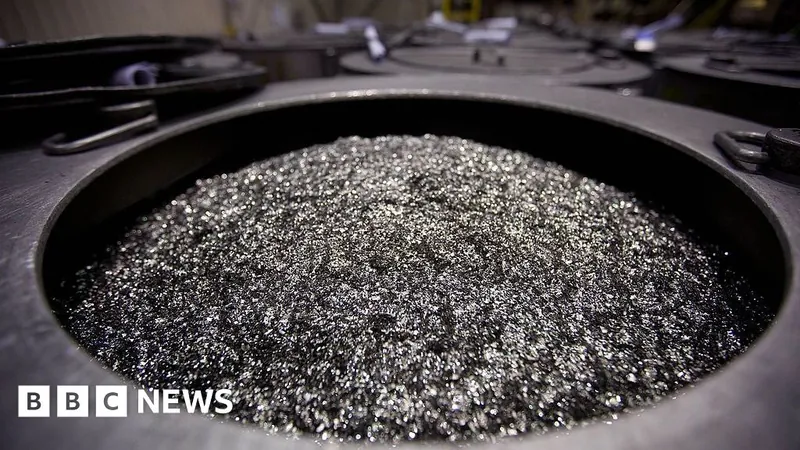
China’s Rare Earth Export Restrictions: A Game-Changer for the U.S.
2025-04-17
Author: Wai
China's Bold Move: Curbing Rare Earth Exports
In a shocking escalation of the trade war, China has restricted exports of critical rare earth minerals, sending ripples of concern through U.S. industries reliant on these essential elements. While tariffs have dominated headlines, this quiet yet strategic maneuver may prove to be a more significant blow to U.S. interests.
Why Are Rare Earth Elements So Crucial?
Rare earth elements, a group of 17 chemically similar materials, are vital for high-tech manufacturing. These minerals are hidden treasures in the tech world—used in everything from electric vehicle motors to advanced medical technologies. Neodymium, for example, powers the magnets that drive speakers and hard drives, while Yttrium and Europium enhance displays in TVs and computers. Without these elements, modern technology as we know it would come to a standstill.
China's Dominance: A Strategic Masterstroke
China's grip on the global rare earth market is unparalleled. Accounting for about 61% of production and a staggering 92% of processing, the country holds a monopoly that leaves the U.S. vulnerable. This monopoly didn't happen overnight—it stems from decades of strategic investment and lower environmental standards. As former leader Deng Xiaoping remarked, 'The Middle East has oil, and China has rare earths.'
The Export Restrictions: What You Need to Know
By imposing control over the export of seven rare earth minerals—primarily the 'heavy' category—China has positioned itself as a gatekeeper in this critical supply chain. Companies will now face stringent licensing requirements, showcasing China's control amid escalating trade tensions. This move poses a significant threat to the U.S., which currently depends on China for 70% of its rare earth imports.
Potential Fallout for the U.S. Economy and National Security
U.S. defense technologies, including the F-35 jets and Tomahawk missiles, heavily rely on these minerals, making the new restrictions alarming. The consequences will extend beyond defense; manufacturing sectors may face severe disruptions, production delays, and skyrocketing prices for high-tech components. As these supplies dwindle, experts warn of an impending crisis for manufacturers and defense contractors alike.
Can the U.S. Shift Gears?
In response to these challenges, President Trump has initiated investigations to reinforce U.S. mineral production. While the U.S. has one operational rare earth mine, it lacks the facilities to process heavy rare earths and typically relies on China for this crucial step. Efforts to secure alternative sources in places like Greenland could be pivotal, but political tensions complicate these ambitions.
The Bigger Picture: A Call for Strategic Reassessment
As tensions rise, the U.S. faces a dual challenge: alienating China, its primary supplier, while potentially damaging relationships with other nations through aggressive trade policies. The future of U.S. access to rare earths may hinge on the ability to forge new international partnerships amidst a turbulent geopolitical landscape.
The stakes are high, and the clock is ticking. America’s reliance on these rare elements now poses not only a threat to its technological edge but also could undermine its national security. Immediate action is needed to reclaim this strategic foothold in the global economy.


 Brasil (PT)
Brasil (PT)
 Canada (EN)
Canada (EN)
 Chile (ES)
Chile (ES)
 Česko (CS)
Česko (CS)
 대한민국 (KO)
대한민국 (KO)
 España (ES)
España (ES)
 France (FR)
France (FR)
 Hong Kong (EN)
Hong Kong (EN)
 Italia (IT)
Italia (IT)
 日本 (JA)
日本 (JA)
 Magyarország (HU)
Magyarország (HU)
 Norge (NO)
Norge (NO)
 Polska (PL)
Polska (PL)
 Schweiz (DE)
Schweiz (DE)
 Singapore (EN)
Singapore (EN)
 Sverige (SV)
Sverige (SV)
 Suomi (FI)
Suomi (FI)
 Türkiye (TR)
Türkiye (TR)
 الإمارات العربية المتحدة (AR)
الإمارات العربية المتحدة (AR)